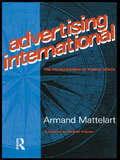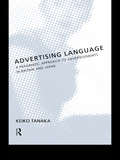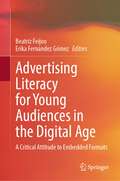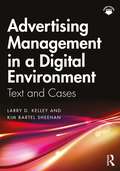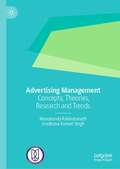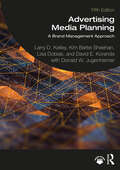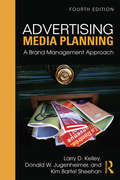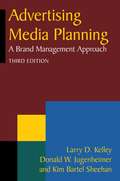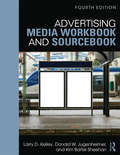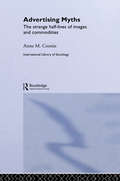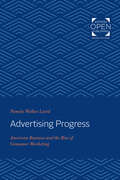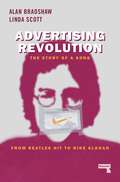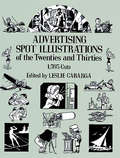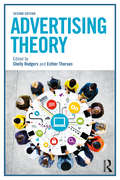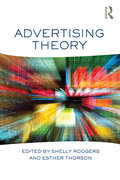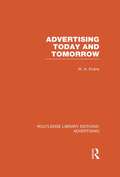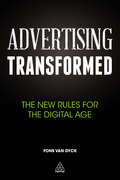- Table View
- List View
Advertising For Dummies
by Gary DahlSo, you need to create an advertising campaign that brings in more customers, adds more dollars to your bottom line, and validates all the reasons you went into business in the first place. But how can you make your ad look and sound like champagne if your budget can only afford beer? Are you wasting your time trying to sell ice to an Eskimo? The world of advertising can seem like a daunting place—but it doesn’t have to be. Advertising for Dummies coaches you through the process and shows you how to: Identify and reach your target audience Define and position your message Get the most bang for your buck Produce great ads for every medium Buy the different media Create buzz and use publicity Research and evaluate your competition Advertising for Dummies offers newbies a real-world look at the ins and outs of advertising—from online and print to TV, radio, and outdoor formats—to show you how you can easily develop and execute a successful campaign on any budget. Plus, you’ll find a glossary of common buzzwords you may encounter along the way so you can talk the talk like the advertising guru you (almost) are! With simple tips on how to write memorable ads and timeless lessons from the legends, this book is packed with everything you need to have people from New York to Los Angeles whistling your jingle.
Advertising Headlines That Make You Rich: Create Winning Ads, Web Pages, Sales Letters and More
by David GarfinkelFrom the legendary copywriting coach: Templates and examples of headlines you can use today to persuade customers—and massively boost profits. The headline makes the difference when it comes to advertising—whether it’s a website, postcard, sales letter, print ad, or direct mail solicitation. Veteran marketers and entrepreneurs know a powerful headline is the most important factor for putting more money in your pocket and attracting, persuading, and retaining your most loyal, valuable customers. Scientific tests have proven it over and over: Just by changing a headline, you can increase an ad’s profitability by two, three, even five times. Finally, here is the world’s #1 resource for quickly and easily creating powerful advertising headlines that are a perfect fit for your business—the kind of headlines that produce record-breaking sales results! Copywriting expert David Garfinkel, who mentors other copywriters for $15,000 and up, offers you one of his most prized possessions: his carefully chosen, market-tested set of advertising headline templates that truly can make you rich! “David Garfinkel is the best copywriter I know.” —Jay Conrad Levinson, bestselling author of the Guerrilla Marketing series
Advertising Impact and Controlling in Content Marketing: Recognize Impact Mechanisms, Optimize Controlling and Adapt Strategy
by Thomas HörnerContent marketing is now a firmly established discipline in online marketing. But how exactly does content marketing work? What are the consequences for strategic content planning and what does valid content marketing controlling look like? This book goes beyond the usual tips on how to implement content marketing by asking what the fundamental effect of content marketing is on companies' customers and prospects. The author not only describes the requirements and procedures for the strategic design of content marketing, but also presents a comprehensive content marketing controlling framework based on the analyzed impact mechanisms. With this book, marketing managers receive a theoretical foundation of the discipline of content marketing as well as numerous recommendations for successful implementation in companies.
Advertising International: The Privatisation of Public Space (Comedia)
by Armand MattelartFirst published in 1991. Routledge is an imprint of Taylor & Francis, an informa company.
Advertising Language: A Pragmatic Approach to Advertisements in Britain and Japan
by Keiko TanakaKeiko Tanaka offers an analysis of the linguistic devices that are used in advertisements, looking at the strategems which advertisers employ to gain and retain the attention of their audience. Using relevance theory as a framework, she sets out its key aspects and applies them to the language of written advertising in Britain and Japan. Particular emphasis is placed on `covert communication', puns and metaphors, and the book contains a unique chapter on images of women in Japanese advertising. It is fully illustrated throughout with recent contrasting advertisements drawn from the two countries. The book provides a compelling analysis of the language of advertising, and an exploration of Relevance Theory that will be of interest to scholars in many fields.
Advertising Literacy for Young Audiences in the Digital Age: A Critical Attitude to Embedded Formats
by Beatriz Feijoo Erika Fernández GómezThis book analyzes how children and adolescents aged between 10 and 17 engage with digital advertising and highlights the importance of promoting advertising literacy to help young audiences recognize advertising and distinguish it from other media content in the digital age. As the advertising sector evolves, incorporating new formats like branded content and influencer marketing, the frontiers between commercial content and regular media become blurred, posing a challenge for children and adolescents to discern persuasive intent in advertising and distinguish advertising from other media content. In this context, it is crucial to assess children and adolescents’ preparedness to navigate digital advertising effectively by understanding their level of advertising literacy. With a higher level of advertising literacy, young audiences can evaluate advertisements, considering factors such as product appeal, presentation, and relevance to their experiences, as well as grasp thepurpose behind advertising and the techniques employed. This contributed volume brings together empirical studies and literature reviews to present an overview of the current research on advertising literacy among boys and girls aged between 10 and 17 in different countries to help educators, policymakers, advertisers, and society at large collaborate in nurturing responsible, informed, and ethically conscious digital citizens. Advertising Literacy for Young Audiences in the Digital Age: A Critical Attitude to Embedded Formats will be of interest to researchers working with media education, media sociology and childhood and adolescence studies. It will also help educators and policymakers develop better strategies to prepare children and adolescents to navigate digital advertising effectively.
Advertising Management
by Larry D Kelley Donald W Jugenheimer Fogarty Klein MonroeThis comprehensive book is designed to serve as a primary text for the Advertising Management course that follows the more general Principles of Advertising course. It can stand alone, or, for instructors who prefer a case-based approach, it can be adopted together with "Cases in Advertising Management" (978-0-7656-2261-7) by the same authors. "Advertising Management" covers a full range of topics for a semester-long course, including financial management, business planning, strategic planning, budgeting, human resource management, ethics, and managing change. There is even a unique section on 'managing yourself' and your own career in advertising. The text includes plentiful figures, tables, and sidebars, and each chapter concludes with useful learning objectives, summaries, discussion questions, and additional resources.
Advertising Management in a Digital Environment: Text and Cases
by Larry D. Kelley Kim Bartel SheehanAdvertising Management in a Digital Environment: Text and Cases blends the latest methods for digital communication and an understanding of the global landscape with the best practices of the functional areas of management. Divided into three core sections, the book provides a truly holistic approach to Advertising Management. The first part considers the fundamentals of advertising management, including leadership, ethics and corporate social responsibility, and finance and budgeting. The second part considers human capital management and managing across cultures, whilst the third part discusses strategic planning, decision making and brand strategy. To demonstrate how theory translates to practice in advertising, each chapter is illustrated with real-life case studies from a broad range of sectors, and practical exercises allow case analysis and further learning. This new textbook offers an integrated and global approach to Advertising Management and should be core or recommended reading for undergraduate and postgraduate students of Media Management, Advertising, Marketing Management and Strategy, Communications and Public Relations. The applied approach provided by case study analysis makes it equally suitable for those in executive education and studying for professional qualifications.
Advertising Management: Concepts, Theories, Research and Trends
by Manukonda Rabindranath Aradhana Kumari SinghThis book explores the concept of advertising and the different ways advertising is understood and evaluated. It dives deep into planning, designing, and executing advertising campaigns on different mediums. It discusses the theoretical and research parts of advertising by critically examining how over the years various hierarchical models and theories are developed by advertising experts.It examines various models and theories that explain why and how advertising is successful in persuading customers/target audiences to buy a product or accept an idea for behavioural change. It will help readers to understand the significance of advertising and consumer psychology which has a critical role in purchasing a product or an idea.
Advertising Media Planning: A Brand Management Approach
by Donald W. Jugenheimer Larry D. Kelley Kim Bartel Sheehan Lisa Dobias David E. KorandaAdvertising Media Planning blends the latest methods for digital communication and an understanding of the global landscape with the best practices of the functional areas of media planning. Taking a unique brand communication approach from an agency perspective, the textbook is organized into four key parts, walking the student through the foundations of brand communication, communication planning, the different media channels available, and the process of preparing, presenting, and evaluating a media plan. This 5th edition has been fully updated to include: • An emphasis throughout on digital and global media planning • New chapters on the role of brand communication, media planning and data analytics, paid media, mobile media, influencer marketing, and B2B media • New mini-case studies and innovation-focused call-out boxes throughout, showcasing media examples from Europe, the United States, and Asia • Discussion questions to foster engagement and understanding A highly regarded new edition, this practical and integrated textbook should be core reading for advanced undergraduate and postgraduate students studying Media Planning, Advertising Management, Integrated Marketing Communication, and Brand Management. Instructor resources include: PowerPoint slides, a test bank, and an instructor manual.
Advertising Media Planning: A Brand Management Approach
by Larry Kelley Kim Sheehan Donald JugenheimerThe planning and placement of advertising media is a multibillion dollar business that critically impacts advertising effectiveness. The new edition of this acclaimed and widely adopted text offers practical guidance for those who practice media planning on a daily basis, as well as those who must ultimately approve strategic media decisions. Full of current brand examples, the book is a "must-read" for all who will be involved in the media decision process on both the agency and client side. Its easy-to-read style and logical format make it ideal for classroom adoption, and students will benefit from the down-to-earth approach, and real-world business examples. Several new chapters have been added to the fourth edition, including: International advertising Campaign evaluation The changing role of media planning in agencies, to give the reader a better grounding in the role of media in an advertising and marketing plan today Evaluating media vehicles, filled with up-to-date examples Search engine marketing, and a thorough revision of the chapter on online display advertising to address the increased emphasis on digital media Gaming, and many new examples of the latest digital media with an emphasis on social media, and a new framework for analyzing current and future social media Increased coverage of communication planning Added focus on the importance of media strategy early on in the book Separate chapters for video and audio media (instead of lumping them together in broadcast). This creates a more in-depth discussion of radio in particular An online instructor's manual with PowerPoint slides and sample test questions is available to adopters.
Advertising Media Planning: A Brand Management Approach
by Donald W. Jugenheimer Larry D. Kelly Kim Bartel SheehanUpdated and greatly expanded to reflect the explosive growth of new media, this acclaimed and widely-adopted text offers practical guidance for those involved in media planning on a daily basis as well as those who must ultimately approve strategic media decisions. Its current, real-world business examples and down-to-earth approach will resonate with students as well as media professionals on both the client and agency side.
Advertising Media Workbook and Sourcebook
by Larry Kelley Donald W. Jugenheimer Kim SheehanThis book provides simple explanations of advertising media sources and calculations along with real-world examples of source material from advertising and media companies. Each of the book's 45 concise units opens with a brief text segment, presents sample source materials from actual advertising and media companies, and concludes with hands-on exercises. Compact units cover all key topics including communication planning and media strategies. A media math primer, standard media formulae, media planning checklists, and a glossary of media terms are also included. Designed for practitioners and students, the latest edition includes new exercises with new media formats and digital media and new units devoted to popular social media channels.
Advertising Murder
by Robert M. ScottoJack Elton was having a rough time trying to settle into the life of a P.I, after his banishment from the Police Force until the body of a young, pregnant Asian woman is found stabbed to death.
Advertising Myths: The Strange Half-Lives of Images and Commodities
by Anne CroninAdvertising is often portrayed negatively, as corrupting a mythically pure relationship between people and things. In Advertising Myths Anne Cronin argues that it is better understood as a 'matrix of transformation' that performs divisions in the social order and arranges classificatory regimes. Focusing on consumption controversies, Cronin contends that advertising is constituted of 'circuits of belief' that flow between practitioners, clients, regulators, consumers and academics. Controversies such as those over tobacco and alcohol advertising, she argues, distil these beliefs and articulate with programmes of social engineering aimed at altering consumption patterns. This book will be essential reading for students and academics of advertising and consumption.
Advertising Progress: American Business and the Rise of Consumer Marketing (Studies in Industry and Society #14)
by Pamela Walker LairdSelected by Choice Magazine as an Outstanding Academic TitleOriginally published in 1998. Drawing on both documentary and pictorial evidence, Pamela Walker Laird explores the modernization of American advertising to 1920. She links its rise and transformation to changes that affected American society and business alike, including the rise of professional specialization and the communications revolution that new technologies made possible. Laird finds a fundamental shift in the kinds of people who created advertisements and their relationships to the firms that advertised. Advertising evolved from the work of informing customers (telling people what manufacturers had to sell) to creating consumers (persuading people that they needed to buy). Through this story, Laird shows how and why—in the intense competitions for both markets and cultural authority—the creators of advertisements laid claim to "progress" and used it to legitimate their places in American business and culture.
Advertising Promotion and Other Aspects of Integrated Marketing Communications
by Terence A. ShimpThe eighth edition of Shimp's market-leading Advertising, Promotion, And Other Aspects Of Integrated Marketing Communications fully integrates all aspects of marketing communication. While continuing to focus on the time honored IMC methods, the text reflects new academic literature and practitioner developments in the field.
Advertising Revolution: The Story of a Song, from Beatles Hit to Nike Slogan
by Linda Scott Alan BradshawThe story of "Revolution" by the Beatles, from its origin as a protest song of the 1960s, to it becoming the musical backdrop for one of the most famous, influential, and controversial adverts of all time.In 1987, Nike released their new sixty-second commercial for Air shoes—and changed the face of the advertising industry. Set to the song “Revolution” by the Beatles, the commercial was the first and only advert ever to feature an original recording of the FaUb Four. It sparked a chain of events that would transform the art of branding, the sanctity of pop music, the perception of advertisers in popular culture, and John Lennon’s place in the leftist imagination.Advertising Revolution traces the song “Revolution” from its origins in the social turmoil of the Sixties, through its controversial use in the Nike ad, to its status today as a right-wing anthem and part of Donald Trump’s campaign set list. Along the way, the book unfolds the story of how we came to think of Nike as the big bad wolf of soulless corporations, and how the Beatles got their name as the quintessential musicians of independent integrity. To what degree are each of these reputations deserved? How ruthlessly cynical was the process behind the Nike ad? And how wholesomely uncommercial was John Lennon’s writing of the song?Throughout the book, Alan Bradshaw and Linda Scott complicate our notions of commercialism and fandom, making the case for a reading of advertisements that takes into account the many overlapping intentions behind what we see onscreen. Challenging the narratives of the evil-genius ad conglomerate and the pure-intentioned artist, they argue that we can only begin to read adverts productively when we strip away the industry’s mysticism and approach advertisers and artists alike as real, flawed, differentiated human beings.
Advertising Revolutionary: The Life and Work of Tom Burrell
by Jason P. ChambersThe ad exec who revolutionized the image of Black Americans in advertising Over a forty-year career, Chicagoan Tom Burrell changed the face of advertising and revolutionized the industry’s approach to African Americans as human beings and consumers. Jason P. Chambers offers a biography of the groundbreaking creator and entrepreneur that explores Burrell’s role in building brands like McDonald’s and Coca-Cola within a deeply felt vision of folding positive images of Black people into mainstream American life. While detailing Burrell’s successes, Chambers tells a parallel story of what Burrell tried to do that sheds light on the motivations of advertising creators who viewed their work as being about more than just selling. Chambers also highlights how Burrell used his entrepreneurial gifts to build an agency that opened the door for Black artists, copywriters, directors, and other professionals to earn livings, build careers, and become leaders within the industry. Compelling and multidimensional, Advertising Revolutionary combines archival research and interviews with Burrell and his colleagues to provide a long overdue portrait of an advertising industry legend and his times.
Advertising Shits in Your Head: Strategies for Resistance
by Vyvian RaoulAdvertising Shits in Your Head calls ads what they are—a powerful means of control through manipulation—and highlights how people across the world are fighting back. It diagnoses the problem and offers practical tips for a DIY remedy. Faced with an ad-saturated world, activists are fighting back, equipped with stencils, printers, high-visibility vests, and utility tools. Their aim is to subvert the advertisements that control us. With case studies from both sides of the Atlantic, this book showcases the ways in which small groups of activists are taking on corporations and states at their own game: propaganda. This is a call-to-arts for a generation raised on ads. Beginning with a rich and detailed analysis of the pernicious hold advertising has on our lives, the book then moves on to offer practical solutions and guidance on how to subvert the ads. Using a combination of ethnographic research and theoretical analysis, Advertising Shits in Your Head investigates the claims made by subvertising practitioners and shows how they affect their practice.
Advertising Spot Illustrations of the Twenties and Thirties: 1,593 Cuts (Dover Pictorial Archive)
by Leslie CabargaLively collection of royalty-free spots for commercial artists dramatizes a host of enterprises: business, communications, education, industry, construction, transportation, legal and healthcare services, sports, travel, entertainment, and much more -- all conveniently arranged by category for ease of use.
Advertising Theory (Routledge Communication Series)
by Esther Thorson Shelly RodgersAdvertising Theory provides detailed and current explorations of key theories in the advertising discipline. The volume gives a working knowledge of the primary theoretical approaches of advertising, offering a comprehensive synthesis of the vast literature in the area. Editors Shelly Rodgers and Esther Thorson have developed this volume as a forum in which to compare, contrast, and evaluate advertising theories in a comprehensive and structured presentation. With new chapters on forms of advertising, theories, and concepts, and an emphasis on the role of new technology, this new edition is uniquely positioned to provide detailed overviews of advertising theory. Utilizing McGuire’s persuasion matrix as the structural model for each chapter, the text offers a wider lens through which to view the phenomenon of advertising as it operates within various environments. Within each area of advertising theory—and across advertising contexts—both traditional and non-traditional approaches are addressed, including electronic word-of-mouth advertising, user-generated advertising, and social media advertising contexts. This new edition includes a balance of theory and practice that will help provide a working knowledge of the primary theoretical approaches and will help readers synthesize the vast literature on advertising with the in-depth understanding of practical case studies and examples within every chapter. It also looks at mobile advertising in a broader context beyond the classroom and explores new areas such as native advertising, political advertising, mobile advertising, and digital video gaming.
Advertising Theory: Theory And Research (Lea’s Communication Series)
by Esther Thorson Shelly RodgersAdvertising Theory provides detailed and current explorations of key theories in the advertising discipline. The volume gives a working knowledge of the primary theoretical approaches of advertising, offering a comprehensive synthesis of the vast literature in the area. Editors Shelly Rodgers and Esther Thorson have developed this volume as a forum in which to compare, contrast, and evaluate advertising theories in a comprehensive and structured presentation. Chapters provide concrete examples, case studies, and readings written by leading advertising scholars and educators. Utilizing McGuire's persuasion matrix as the structural model for each chapter, the text offers a wider lens through which to view the phenomenon of advertising as it operates within various environments. Within each area of advertising theory - and across advertising contexts - both traditional and non-traditional approaches are addressed, including electronic word-of-mouth advertising, user-generated advertising, and social media advertising contexts. As a benchmark for the current state of advertising theory, this text will facilitate a deeper understanding for advertising students, and will be required reading for advertising theory coursework.
Advertising Today and Tomorrow: Advertising: Advertising Today And Tomorrow (Routledge Library Editions: Advertising)
by W.A. EvansAdvertising Today and Tomorrow surveys the structure and function of modern advertising (and in particular the modern advertising agency), investigates how appropriate its machinery is for modern business requirements, and suggests how, both for the good of itself and its clients, it can best equip and refine itself for the future. It is of great use to students of business, particularly of marketing, in the colleges, universities and business schools, as well as being of great help to young people seeking to make advertising their career. First published in 1974.
Advertising Transformed
by Fons Van DyckIs advertising dead or alive? Quite simply the 20th century concept of advertising is dead and it will have to reinvent itself in order to survive. This transformation is going on as we speak. Brands that invest in advertising during an economic recession prove to overcome them quicker as times of crisis are typically moments when consumers' mental pecking order is being shaken up. When brand market shares are shifting advertising can be a determining factor for the future of brands. In Advertising: dead or alive, Fons Van Dyck offers strategic answers to questions marketers and managers have about the effectiveness of advertising in the digital age. He discusses the basics of how advertising works in marketing and communications planning today. What is the core target group of advertising? Which strategy works best? Does social media mean the end of advertising? Why is the integration of marketing and communication becoming increasingly important? Are consumers better at advertising? He addresses current advertising practice. What works best: a USP (unique selling proposition) or ESP (emotional selling proposition)? Is the future of advertising global or local? Is 'green' really a sales argument, and if it is, for what type of customer? What is the power of 'retro' in advertising? He explores what academic evidence is available today that demonstrates the added value of marketing and advertising for companies and organisations, even in times of economic recession and concludes by focusing on some of the most important topics of criticism brands and advertising in particular are facing and on how brands are responding. Backed by case studies of Effie Winning brands this book gives the reader concise and accessible insights into the modern form of advertising.



